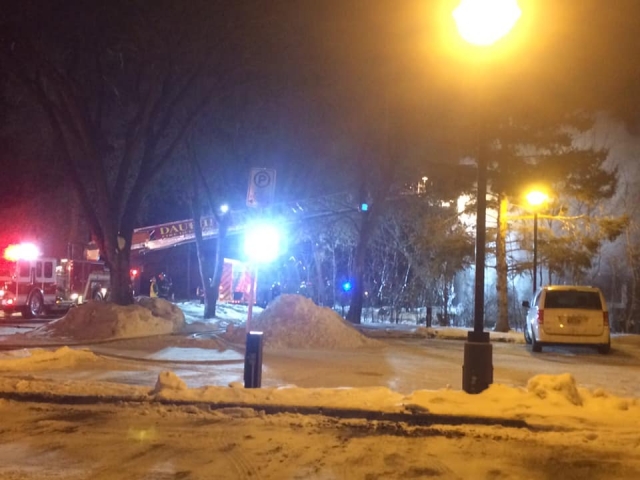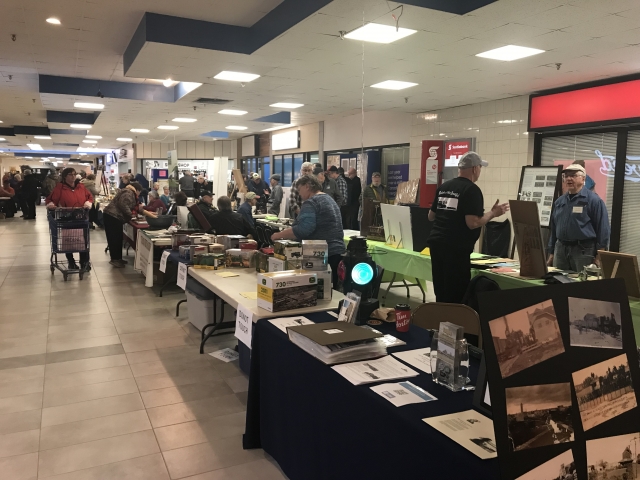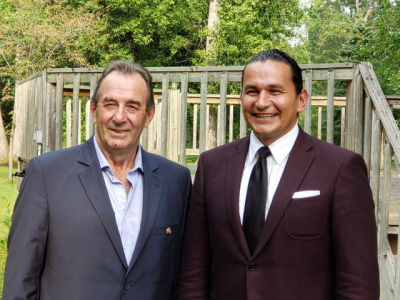 NewsNow
NewsNow
The Gilbert Plains Splash Park is one step closer to becoming a reality after a generous donation from Kelleher Ford in Dauphin.
During the month of January, Kelleher Ford donated $100 from every vehicle purchased and $50 from every Ford Maintenance Plan and Extended Warranty purchased to the Splash Park. At the end of the day, Kelleher Ford donated $1950.
"This is absolutely huge for us, we're so grateful that they reached out to us," said Cory Gulenchin. "They worked extremely hard off to get us the most needed funds. Thank you so much to Kelleher Ford for what they've done, we love working with them."
The Splash Park which will be located at Centennial Park where the current wading pool is will be state of the art. The cost of it will roughly be $400,000. Through donations and grants, the goal is to complete the park as soon as possible for the community and everyone to enjoy.
"This isn't just for our community, it's for the surrounding communities around us," concluded Gulenchin. "This is a one of a kind Splash Park that no one has seen before. It's going to be incredible and we all can't wait till this gets built and ready to go."
- Details
- Contributed by Darnell Duff
A couple of weeks ago we reported on the firey train derailment near Guernsey, Saskatchewan which resulted in over a million litres of oil spilled, and heavy speed restrictions immediately after from federal Transport Minister Marc Garneau on trains carrying dangerous goods.
After having time to look at things, those restrictions have been updated.
"Higher Risk Key Trains", meaning trains carrying either a single dangerous goods commodity or a combination of 80 or more cars with dangerous goods can go up to 48 km/h in metropolitan areas, or 40 km/h in metro areas without signalled crossings.
In non-metro areas where track signals are present, higher risk key trains can go up to 80 km/h, however that goes down to 40 km/h where there are no track signals.
For "Key Trains" defined as carrying 20 or more cars containing dangerous goods, or one or more cars of toxic inhalation gas, they can go up to 56 km/h in metro areas.
For non-metro areas with track signals, key trains can go up to 80 km/h, but that goes down gto 64 km/h in non-metro areas without track signals. The new measures will be in effect until April 1st as the federal government works with railways to develop new safety measures.
Originally, speed limits for trains carrying 20 or more cars with dangerous goods were slowed down to 32 km/h from 64 in metro areas, and to 40 km/h from 80 everywhere else.
- Details
- Contributed by Alec Woolston
Yesterday was Louis Riel Day and there were lots of activities down at the Fort Dauphin Museum.
Theresa Deyholos, executive director for the Fort Dauphin Museum, says the event was very well attended.
“The weather turned out to be really nice and it was quite enjoyable for families to take part in the event today.”
Deyholos says there’s significance to having Louis Riel Day activities.
“It tells us about the history of the metis people and Louis Riel’s role that he played in Manitoba and to give a voice to the Metis people.”
Deyholos says her favourite part is listening to the Metis music, seeing the kids dance to the music, and all the outdoor activities for those to enjoy.
Tammy Chief compares this year’s event to past years.
“Well, being Manitoba’s 150th, and our founding father of confederation, Louis Riel bringing Manitoba into confederation, this is a great day, and a great celebration.”
She says Louis Riel and the metis culture is all about bringing people together and this event is a great way to do that.
- Details
- Contributed by Isaac Wihak
The Manitoba snowshoe run 2020 kicked off this morning at 10am.
The 5km snowshoe walk at the Selo Site had a good turnout this year with 47 participants entered.
There were added activities along the way this year including snowball throwing targets and snow taffy.
Participants were treated with food and drinks afterwards.
Race director, Brian Byers says that the money raised goes back into the community.
“We’re raising money to put back into the community for the active living funds. That money goes towards things to help people get out and be active. Things like the skate park or the trails that were using today.”
- Details
- Contributed by Tess Kovach
Update: As of 6:30 yesterday, water is back up and running in Gilbert Plains, however the municipality has put a precautionary boil water advisory in effect.
The advisory is in place and will be until the testing of the systems is complete. We will let you know when this happens.
---------
At 9 am in Gilbert Plains, the entire water distribution system will be shut down for repairs.
A water main break is the cause for the repairs.
Michael Steven, urban lead hand in Gilbert Plains, says the entire town will have the water shut off and a precautionary boil water advisory will also be in place until further notice.
There's no word on how long the water will be turned off for.
- Details
- Contributed by Isaac Wihak
Right around 10 pm on Valentine's Day, the Dauphin Fire Department was dispatched for a house fire.
The fire, located on 3rd Avenue Southwest between Main Street and 1st Street Southwest, had fully engulfed the house making entry impossible.
Fire fighters were told there could be occupants in the home, so they battled the blaze to the point where they could search inside the home.
Following the search, no occupants were found.
Crews were on scene until about 6 this morning to make sure the fire didn't rekindle.
The fire has been deemed to be accidental-electrical in nature.
There aren't any damage estimates at this time, but the home is a complete loss.
- Details
- Contributed by Isaac Wihak
6,500 more Manitobans were working in January compared to the month before, according to new employment statistics.
The increase is Manitoba’s largest in over a decade.
Premier Brian Pallister said the results are proof that his government is moving the province forward.
‘We continue to create a business-friendly environment and our plan to grow the private sector for the benefit of all Manitobans is working.”
The latest figures from Stats Can show that the increase in employment was accompanied by a decline in the province’s unemployment rate to 5.1 percent, down from 5.3 percent in 2019.
Manitoba now has the second-lowest unemployment rate in the country.
The labour force in Manitoba has increased by 1.1 percent, while the country’s rate has grown by 0.1 percent.
Pallister noted that the job growth in Manitoba shows the success of the province’s Economic Growth Action Plan, which outlines a goal of creating 40,000 jobs in Manitoba over the next four years.
- Details
- Contributed by Josh Sigurdson
Yesterday was the annual Heritage Days Fair at the Dauphin Marketplace Mall.
The fair had displays from various organizations showcasing the history of Dauphin and surrounding communities.
The fair showcased items such as pioneer tools, toys, and collectibles from organizations including the Fort Dauphin Museum, Dauphin Rail Museum, and Dauphin Family History Group, and much more.
Bert Parsons of the Dauphin Agricultural Heritage Club said that the fair helps people learn about what life was like in the past.
“It’s good for the young children to see the way life used to be years ago. It’s quite a change from today. It’s just nice to be out here and talk to people about our stuff.”
Randal Townsend from Townsend Collection said it’s important to preserve memories and information from the past.
“I think the past has a lot to offer. Everything was simplistic way back then. It was a developing time for communities to grow, and it’s good to have memories and good times.”
- Details
- Contributed by Tess Kovach
Do you go big on Valentine’s day?
That was the question we asked Parklander’s today.
The majority of people that were asked said they don’t think it’s necessary to make a big deal out of valentine’s day.
Eugene from Crane River said “I don’t think there should be one day. I think you should show your love all year round.”
Jerry from Dauphin said “It's not really a big deal. After 53 years being married I’m buying my sweetie some flowers, and tonight we’re going out for supper.”
Julie from Dauphin said “No, I don’t think the big things count. I think the little things count.”
In a recent Gains’ giant poll on Facebook, 90% out of 80 votes say they don’t like to make a big deal out Valentine’s Day.
- Details
- Contributed by Tess Kovach
With protests of the Coastal GasLink pipeline in B.C. taking place across the country, Manitoba Premier Brian Pallister says he is open to talking about a pipeline to Churchill.
The notion comes seven years after the NDP government of the time said no to the idea of shipping oil by rail to Churchill.
“The previous NDP government dismissed the very idea of shipping oil products out of Churchill out of hand, without even looking at it,” said Pallister. “We’re very, very big on northern development and I’m very, very committed to working in partnership with affected people in northern Manitoba-including First Nations and Métis people- to make sure that we find great job opportunities and economic development opportunities for northern communities.”
Many politicians have pushed for a Churchill pipeline to try and get oil form Alberta and Saskatchewan onto tankers bound for international markets.
As it stands right now there is no company proposing to build the pipeline.
When a proposal was made to ship oil to Churchill by rail in 2013, the Manitoba government opposed the plan over fears of a potential spill devastating the environment, and in turn tourism to the region.
Many opponents have also said that the boggy terrain of the area would cause stress to the pipeline due to the subarctic ground heaving and shifting.
- Details
- Contributed by Josh Sigurdson
At the 2020 CropConnect Conference in Winnipeg, Federal Minister of Agriculture and Agri-Food Marie-Claude Bibeau announced new funding for projects that will help the grain industry in Canada.
The Canada Grains Council will receive $1.2 million from the federal government to help manage risk and improve public trust. $430,000 will go towards developing a pilot insurance product for grain exporters to address the risks they face in regards to having shipments rejected at foreign borders.
The government said it wants to ensure that grain farmers are protected against the uncertainty of the global market. This project will help the government on its way to accomplishing its goal of achieving $75 billion in annual exports by 2025.
The CGC will also receive $789,558 to develop a Code of Practice for the production of grains. The new codes will be voluntary and led by farmers, and they will help farmers lay out the best practices to follow to be considered sustainable.
The Government of Canada says it knows how important grain farmers are to the national economy and rural communities, and they will continue to work on their goal to support farmers and grow the ag sector in Canada.
- Details
- Contributed by Josh Sigurdson


















